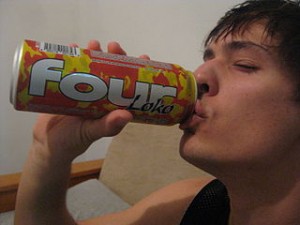Experiences that take place outside of their context may evoke more intense feelings

One routine afternoon, in Copenhagen's central station, a street performer sets up a drum in the center of the great hall. A cellist joins him. A woman approaches with a flute in her hand. They play a piece that sounds familiar. Clarinet, bassoon and other instruments join the playing. People pull out their cell phones and start taking pictures. Within minutes, an entire symphony orchestra gathers in the heart of the station, and suddenly it is clear that this is not a typical street show: it is the Copenhagen Philharmonic, playing Ravel's Bolero. This musical flash mob gives a very different experience from listening to an orchestra playing in a hall, perhaps because of the unique environment.
That kind of disconnect could explain the unusual effect of Four Loko, a caffeinated, fruit-flavored alcoholic drink invented by three Ohio State University students in 2005. In 2010, following a series of reports of hospitalizations, the US Food and Drug Administration (FDA) declared that adding caffeine to alcoholic beverages was against the law, and the makers of Four Loko changed the product accordingly.
Is this the end of the story? It's clear that caffeinated alcoholic beverages are dangerous, but is caffeine to blame? Shepard Siegel, a psychologist from McMaster University in Ontario, who recently published an article on the subject in the journal Perspectives on Psychological Science, thinks otherwise.
First, caffeine does not seem to affect how alcohol is absorbed in the body. Moreover, it is known that many drugs, and alcohol among them, have a stronger effect when consumed in unusual circumstances. In a 1976 article published in the journal Science, Siegel called this phenomenon "unique tolerance for the situation". Environmental variables, from the room where the drug is used to different tastes, may affect a person's tolerance to a particular drug. The origin of the phenomenon is, at its core, classical Pavlovian conditioning. The body of a person who drinks in social circumstances learns to prepare for alcohol in response to the environment, even before the actual drinking begins. Siegel claims that Four Loko causes increased drunkenness due to the unexpected way in which the alcohol is served: the drink does not taste like alcohol.
If Siegel is right, the "decaffeinated" approach taken by the drink's makers could prove problematic. They announced a new drink that comes "with a new flavor profile every four months". But this will not solve the problem. If someone develops a tolerance to the effects of alcohol in one taste, this tolerance will disappear when the next taste appears. Intentionally or not, the drink exploits the phenomenon of tolerance unique to the condition. This drink and the Copenhagen Philharmonic Flash Band have more in common than the cup of coffee you drink in the morning.

One response
It could be that despite everything, Jason J. Goldman may have reached a very inaccurate result/conclusion?? -> See: Iwaska/http://he.wikipedia.org/wiki